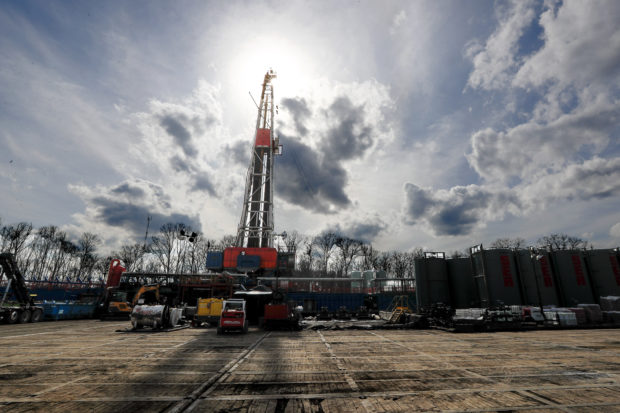Trump’s EPA dumps methane emissions rule for oil, gas fields
HARRISBURG, Pa. — President Donald Trump’s administration is undoing Obama-era rules designed to limit greenhouse gas emissions from oil and gas fields and pipelines, formalizing the changes Thursday in the heart of the nation’s most prolific natural gas reservoir and in the premier presidential battleground state of Pennsylvania.

FILE – In this March 12, 2020, file photo, the sun shines through clouds above a shale gas drilling site in St. Mary’s, Pa. President Donald Trump’s administration is expected to undo Obama-era rules designed to limit greenhouse gas emissions from oil and gas fields and pipelines, formalizing the changes in the heart of the nation’s most prolific natural gas reservoir and in the premier presidential battleground state of Pennsylvania. (AP Photo/Keith Srakocic, File)
Andrew Wheeler, the Environmental Protection Agency administrator, signed the rollback of the 2016 methane emissions rule in Pittsburgh as the agency touted the Trump administration’s efforts to “strengthen and promote American energy.”
The EPA first proposed the rollback last year, accusing the Obama administration of enacting a legally flawed rule, and agency officials said it would save companies tens of millions of dollars a year in compliance requirements without changing the trajectory of methane emissions.
But states, including California, and a coalition of environmental advocacy groups have warned that the changes would be illegal — not to mention a setback in the fight against climate change — and are expected to quickly sue to block it.
The White House took the event to Pittsburgh, home to the headquarters of many companies exploring the Marcellus Shale, the booming natural gas reservoir that vaulted Pennsylvania to the nation’s No. 2 gas state, behind Texas.
“EPA has been working hard to fulfill President Trump’s promise to cut burdensome and ineffective regulations for our domestic energy industry,” Wheeler said in a statement.
Reflecting the ever-present politics of the presidential campaign, Wheeler’s statement also cast blame onto the presumptive Democratic nominee, former Vice President Joe Biden, saying that “regulatory burdens put into place by the Obama-Biden Administration fell heavily on small and medium-sized energy businesses.”
Pennsylvania is of prime importance in November’s presidential election, and the natural gas industry is already playing a central role in TV attack ads being aired in the state by Trump’s allies.
Preventing methane leaks from well-site equipment and pipelines has become important for regulators because methane is a potent greenhouse gas, over 80 times more powerful than carbon dioxide in trapping heat in the atmosphere over a 20-year period, according to climate researchers.
The oil and gas industry was responsible for nearly 30% of the nation’s methane emissions in 2018, and methane accounted for 10% of the nation’s greenhouse gas emissions, according to the EPA.
The Trump administration is eliminating the requirement that companies fix methane leaks discovered from twice-yearly inspections on all equipment installed after 2015 at well sites and downstream segments, such as pipelines, compressor stations and storage tanks.
Supporters of the rule maintained that, based on reports the companies file, it seemed to be helping reduce methane emissions.
Companies will still have to check equipment for leaks at some higher-producing well sites for smog-forming compounds, but Thursday’s changes relaxed those standards and producers won’t have to check at pipelines or downstream equipment.
Any leaks they fix help capture methane. But, far more importantly, killing the methane emissions rule also blocks a legal requirement for the EPA to extend the rule to cover many more pieces of equipment installed before 2015, environmental advocates say.
“We’ll see them in court because this is blatantly illegal,” said David Doniger, senior strategic director of the climate and clean energy program at the Natural Resources Defense Council.
Robert Howarth, an ecology professor at Cornell University, estimated that shale oil and gas production in North America accounted for one-third of the total global increase in methane emissions over the past year.
Rolling back methane measures now is “dangerously reckless,” Howarth said. “Methane emissions are increasing rapidly, and the oil and gas industry is clearly part of the problem.”
Peter Zalzal, an attorney for the Environmental Defense Fund, said that, without federal leadership, stronger state regulation will be even more important.
Some states — such as California, Colorado, Pennsylvania and Wyoming — have methane standards that are comparable or stronger than the EPA’s 2016 rule. But many big oil and gas states — such as Texas — do not, Zalzal said.
Oil and gas industry representatives pushed for the methane rollbacks, fearing tougher, more expensive rules covering emissions from older equipment. Smaller, independent operators, in particular, hailed the changes as important to their survival.
“The issue for producers has never been whether regulations were necessary; it has always been whether the regulations were sound and cost effective,” the Independent Petroleum Association of America said in a statement.
Still, some companies opposed a rollback, noting they had pledged to reduce emissions or pointing out that they were already exceeding the rule’s requirements.
Some oil majors including BP, Shell and ExxonMobil have called on Trump to strengthen efforts to cap methane emissions.
“The negative impacts of leaks and fugitive emissions have been widely acknowledged for years, so it’s frustrating and disappointing to see the administration go in a different direction,” Shell’s U.S. president, Gretchen Watkins, said in a statement.
In 2016, Trump eked out a win in Pennsylvania — the first Republican presidential candidate to capture it since 1988 — by piling up support with Pennsylvania’s rural areas and working-class whites.
Since then, Trump has eagerly promoted the state’s gas industry, underscoring his focus on shoring up his base as his appointees have moved to relax pollution standards, expand extraction on federal lands, boost the export of liquefied natural gas and restrict the ability of states to block pipelines.